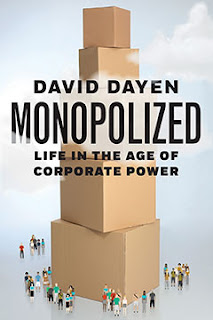This is taken from my most recent updates at this post about my reading for the year. I decided to put my research about how rebellions and revolutions arose and how they contributed to the democratic instinct on hold for a bit and read some books about current political-economic conditions. The three books I signed out appeared as an accidental trilogy.
Thom Hartmann's The Secret History of Neoliberalism: How Reaganism Gutted America and How to Restore Its Greatness, David Dayen's Monopolized: Life in the Age of Corporate Power, and Wolfgang Streeck's How Will Capitalism End? Essays on a Failing System, worked out to tell the story of how we got here (Hartmann), what the end-result of neoliberal theory has produced (Dayen), and the likely near-future for humanity given the failure of neoliberalism specifically and capitalism in general.
First, Hartmann's Secret History of Neoliberalism:
This book goes back to the founding of the Mont Pelerin Society, where liberal economists like Friedrich Hayek and Ludwig von Mises got together after World War II to come up with a set of prescriptions that would save civilization from totalitarian fascism and communism. In their theoretical fantasy-world, the capitalist free market, when left to its own devices, functioned perfectly. Unregulated prices sent signals to profit-maximizers who self-interestedly produced wealth for themselves that would subsequently trickle down or filter out into the wider society. It was the best, nay, the ONLY way to run society.
The problem was that it didn't work fast enough and it didn't always make everybody richer. Some people suffered at the hands of the market. But that is life. That is reality. However, some people don't want to accept reality. Like the toiling masses for instance. Democracy was dangerous in that it gave uneducated, immature populations, the power to interfere with the capitalist free market, creating regulations and rigidities and distortions that would eventually produce disaster.
Supposedly the inflation and high levels of unemployment of the 1970's ("stagflation") was the inevitable disaster that they'd predicted. "Stagflation" supposedly discredited the Keynesian social welfare state, the class compromise of the post-war era. It was time to sweep away such nonsense and impose the technocratic, neoliberal, free market regime that economic "SCIENCE" had established as the one, true way for humanity. First, in the UK under Margaret Thatcher, and soon afterwards, by Ronald Reagan in the USA.
America’s most popular progressive radio host and New York Times bestselling author Thom Hartmann reveals how and why neoliberalism became so prevalent in the United States and why it's time for us to turn our backs to it.
With four decades of neoliberal rule coming to an end, America is at a crossroads. In this powerful and accessible book, Thom Hartmann demystifies neoliberalism and explains how we can use this pivotal point in time to create a more positive future.
This book traces the history of neoliberalism—a set of capitalistic philosophies favoring free trade, low taxes on the rich, financial austerity, and deregulation of big business—up to the present day. Hartmann explains how neoliberalism was sold as a cure for wars and the Great Depression. He outlines the destructive impact that it has had on America, looking at how it has increased poverty, damaged the middle class, and corrupted our nation’s politics.
America is standing on the edge of a new progressive era. We can continue down the road to a neoliberal oligarchy, as supported by many of the nation’s billionaires and giant corporations. Or we can choose to return to Keynesian economics and Alexander Hamilton’s “American Plan” by raising taxes on the rich, reversing free trade, and building a society that works for all.
Indeed. Hartmann advocates protectionism and some form of mercantilism. Economic nationalism. He has chapters on how neoliberalism destroyed Russia and Chile, and other chapters on how the rejection of neoliberalism by the Chinese and South Koreans made them stronger. He talks about how Reaganism has destroyed the state's ability to provide necessary services and hollowed-out the economy, causing unemployment, inequality and a loss of skills. His chapters on the out-sourcing of military procurement by profiteering, gouging oligarchs, and how this has weakened the USA's ability to produce its own weapons is playing out before our eyes in the [welcomed, to my relieved eyes] USA's failure to ramp-up production for the proxy-war in Ukraine.
Personally, I don't favour economic nationalism. I prefer regional integration of large areas (for instance, North America from Panama to the Arctic, with the free movement of people, and the expansion of democracy and human rights and legislative authority over the economy for everyone within this group. And I think Hartmann's belief that a returned to enlightened, regulated capitalism under a restored New Deal is unrealistic.
David Dayen's Monopolized describes the world that was created by neoliberal ideologues. A state that does not, by pretending that it cannot, regulate capitalism, loses the ability to control oligarchies and their collusion, which amounts to the same thing as monopoly.
And when uncontrolled oligarchies exist, things get bad for the majority:
Over the last forty years our choices have narrowed, our opportunities have shrunk, and our lives have become governed by a handful of very large and very powerful corporations. Today, practically everything we buy, everywhere we shop, and every service we secure comes from a heavily concentrated market.
This is a world where six major banks control most of our money, four airlines shuttle most of us around the country, and four major cell phone providers connect most of our communications. If you are sick you can go to one of three main pharmacies to fill your prescription, and if you end up in a hospital almost every accessory to heal you comes from one of a handful of large medical suppliers.
Dayen, the editor of the American Prospect and author of the acclaimed Chain of Title, provides a riveting account of what it means to live in this new age of monopoly and how we might resist this corporate hegemony.
Through vignettes and vivid case studies Dayen shows how these monopolies have transformed us, inverted us, and truly changed our lives, at the same time providing readers with the raw material to make monopoly a consequential issue in American life and revive a long-dormant antitrust movement.
It is a damning indictment of neoliberal nonsense. A very worthwhile read. Each chapter shows how powerful corporations exploit, abuse, and plunder. It's infuriating. It is the world we've been living in since Reaganism. It makes life for ordinary people more expensive, insecure, and unjust. Read it.
Finally, Streeck's How Will Capitalism End? describes the place we find ourselves in since the 2008 financial crisis, which was caused by unregulated, neoliberal, financialized capitalism. It is an era of corruption, stagnation and increasing social-economic inequality.
Capitalism destroyed the ability of institutions (politics, labour unions) to control it. But it needs to be controlled or else we have the abominations described by Dayen and the nightmare dystopia described by Streeck.
Capitalism is in critical condition. Growth is giving way to secular stagnation, inequality is leading to instability, and confidence in the capitalist money economy has all but evaporated. In How Will Capitalism End?, Wolfgang Streeck, an observer of contemporary politics and economics, argues that capitalism’s shotgun marriage with democracy that began in 1945 is breaking up because the regulatory institutions restraining its advance have collapsed. After the final victory of capitalism over its enemies, there is no political agency capable of rebuilding them in sight. The capitalist system is stricken with at least five worsening disorders for which no cure is at hand: declining growth, oligarchy, starvation of the public sphere, corruption, and international anarchy. Wolfgang Streeck asks whether we are witnessing a long and painful period of cumulative decay: of intensifying frictions, of fragility and uncertainty, and of a steady succession of "normal accidents."
It is a fairly dense, detailed work. This is a scholarly work of social-economic analysis. Which makes it all the more worthwhile. It focuses on Europe but makes connections to other polities, especially the United States of America. In the European Union, neoliberal technocrats have created the true dream of the Mont Pelerin ideologues. An economic zone where democracy has been effectively removed from decision making. What that resulted in was a European banking system that tried to imitate the massive (if imaginary) wealth creation (based on fraud) of Wall Street and the City of London. This saw massive, easy loans from German and French banks to real-estate speculation and etc., in the Mediterranean countries like Spain, Italy and Greece. With the 2008 international financial crisis that all went bust and the technocratic geniuses are focusing on austerity as the solution. But austerity is only going to squeeze the European working class to pay back the bankers the money that the bankers themselves lost.
Streeck talks about a taxation and redistribution state in the 1945-73 era. Redistribution was partly an increase in working class consumption to compensate for continued political inferiority. Briefly there was the inflation state of the 1970's as wage increases were allowed to meet the price increases of the era. Then Reagan initiated the debt state. An era when first the public sector, and then the private sector (including households) were allowed to borrow to maintain consumption. Now we're in the consolidation era. Canada probably got their first with the blinkered austerity and tax-cuts era of Paul Martin. The public sector is cannibalized to pay for the tax-cuts for the wealthy.
Streeck points out how the 2008 crisis and the pandemic forced governments to return to deficits, but this simultaneously alarmed the fucking oligarchs about the solvency of their cash cow. MORE AUSTERITY!
Streeck's book is particularly important for how he realistically explains that this state of affairs of lurching from neoliberals' self-imposed disasters, one after another, will probably be extended, because no viable alternative movements exist. A sad, but welcome bit of reality after all the useless patting themselves on the back of Leftists, endlessly celebrating their tiny, or non-existent "victories" as the world careens out of control and conditions for the majority continue to decline.
I'm tired of writing today.














